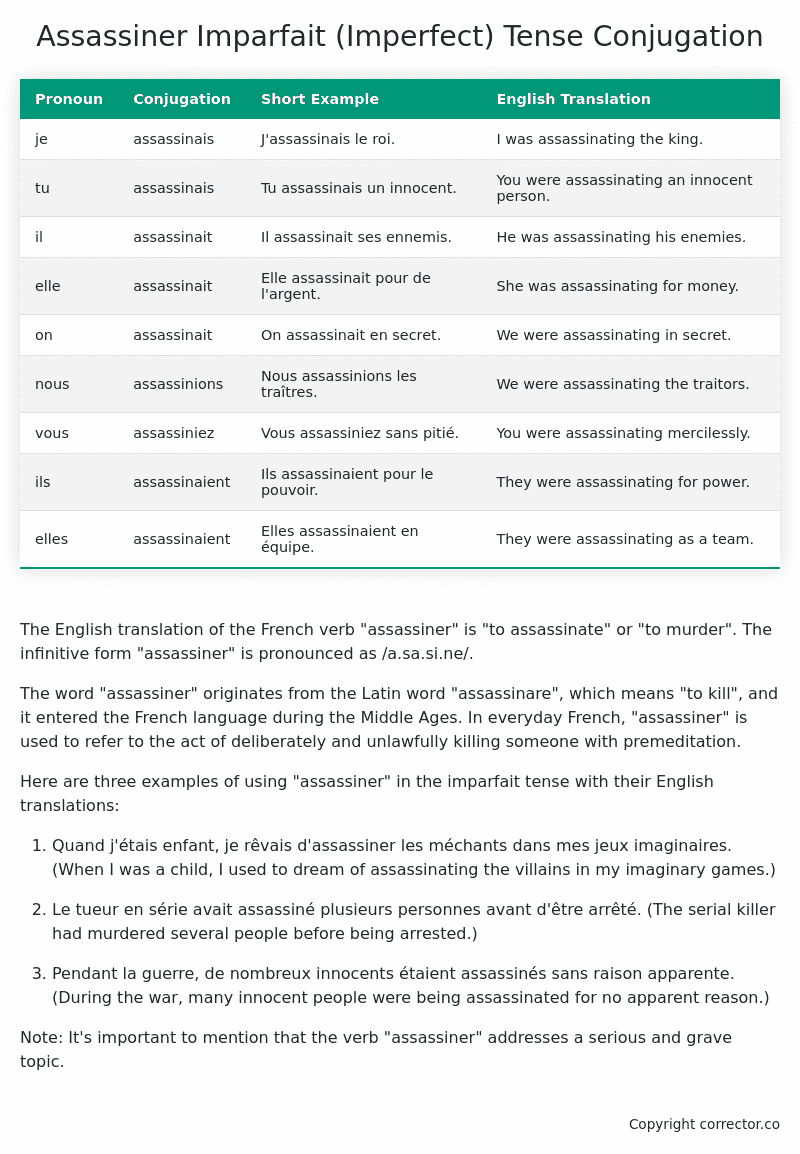Imparfait (Imperfect) Tense Conjugation of the French Verb assassiner
Introduction to the verb assassiner
The English translation of the French verb “assassiner” is “to assassinate” or “to murder”. The infinitive form “assassiner” is pronounced as /a.sa.si.ne/.
The word “assassiner” originates from the Latin word “assassinare”, which means “to kill”, and it entered the French language during the Middle Ages. In everyday French, “assassiner” is used to refer to the act of deliberately and unlawfully killing someone with premeditation.
Here are three examples of using “assassiner” in the imparfait tense with their English translations:
-
Quand j’étais enfant, je rêvais d’assassiner les méchants dans mes jeux imaginaires.
(When I was a child, I used to dream of assassinating the villains in my imaginary games.) -
Le tueur en série avait assassiné plusieurs personnes avant d’être arrêté.
(The serial killer had murdered several people before being arrested.) -
Pendant la guerre, de nombreux innocents étaient assassinés sans raison apparente.
(During the war, many innocent people were being assassinated for no apparent reason.)
Note: It’s important to mention that the verb “assassiner” addresses a serious and grave topic.
Table of the Imparfait (Imperfect) Tense Conjugation of assassiner
| Pronoun | Conjugation | Short Example | English Translation |
|---|---|---|---|
| je | assassinais | J’assassinais le roi. | I was assassinating the king. |
| tu | assassinais | Tu assassinais un innocent. | You were assassinating an innocent person. |
| il | assassinait | Il assassinait ses ennemis. | He was assassinating his enemies. |
| elle | assassinait | Elle assassinait pour de l’argent. | She was assassinating for money. |
| on | assassinait | On assassinait en secret. | We were assassinating in secret. |
| nous | assassinions | Nous assassinions les traîtres. | We were assassinating the traitors. |
| vous | assassiniez | Vous assassiniez sans pitié. | You were assassinating mercilessly. |
| ils | assassinaient | Ils assassinaient pour le pouvoir. | They were assassinating for power. |
| elles | assassinaient | Elles assassinaient en équipe. | They were assassinating as a team. |
Other Conjugations for Assassiner.
Le Present (Present Tense) Conjugation of the French Verb assassiner
Imparfait (Imperfect) Tense Conjugation of the French Verb assassiner (You’re reading it right now!)
Passé Simple (Simple Past) Tense Conjugation of the French Verb assassiner
Passé Composé (Present Perfect) Tense Conjugation of the French Verb assassiner
Futur Simple (Simple Future) Tense Conjugation of the French Verb assassiner
Futur Proche (Near Future) Tense Conjugation of the French Verb assassiner
Plus-que-parfait (Pluperfect) Tense Conjugation of the French Verb assassiner
Passé Antérieur (Past Anterior) Tense Conjugation of the French Verb assassiner
Futur Antérieur (Future Anterior) Tense Conjugation of the French Verb assassiner
Subjonctif Présent (Subjunctive Present) Tense Conjugation of the French Verb assassiner
Subjonctif Passé (Subjunctive Past) Tense Conjugation of the French Verb assassiner
Subjonctif Imparfait (Subjunctive Imperfect) Tense Conjugation of the French Verb assassiner
Subjonctif Plus-que-parfait (Subjunctive Pluperfect) Tense Conjugation of the French Verb assassiner
Conditionnel Présent (Conditional Present) Tense Conjugation of the French Verb assassiner
Conditionnel Passé (Conditional Past) Tense Conjugation of the French Verb assassiner
Conditionnel Passé II (Conditional Past II) Tense Conjugation of the French Verb assassiner
L’impératif Présent (Imperative Present) Tense Conjugation of the French Verb assassiner
L’impératif Passé (Imperative Past) Tense Conjugation of the French Verb assassiner
L’infinitif Présent (Infinitive Present) Tense Conjugation of the French Verb assassiner
L’infinitif Passé (Infinitive Past) Tense Conjugation of the French Verb assassiner
Le Participe Présent (Present Participle) Tense Conjugation of the French Verb assassiner
Le Participe Passé (Past Participle) Tense Conjugation of the French Verb assassiner
Struggling with French verbs or the language in general? Why not use our free French Grammar Checker – no registration required!
Get a FREE Download Study Sheet of this Conjugation 🔥
Simply right click the image below, click “save image” and get your free reference for the assassiner imparfait tense conjugation!

Assassiner – About the French Imparfait Tense
NOTE: To take a deep dive into all the French tenses then see our article on Mastering French Tense Conjugation.
Formation of the Imparfait Tense
For regular -er verbs:
For regular -ir verbs
For regular -re verbs
Common Everyday Usage Patterns
Description of Past Habits
Background Information
Mental and Emotional States
It’s employed to express emotions, thoughts, or physical sensations in the past. For example: “J’étais content quand il est arrivé.” (I was happy when he arrived.)
Ongoing Actions
Points to Note About the Imparfait Tense
Passé Composé vs. Imparfait
Conditional
Si Clauses
Narration
I hope you enjoyed this article on the verb assassiner. Still in a learning mood? Check out another TOTALLY random French verb imparfait conjugation!


